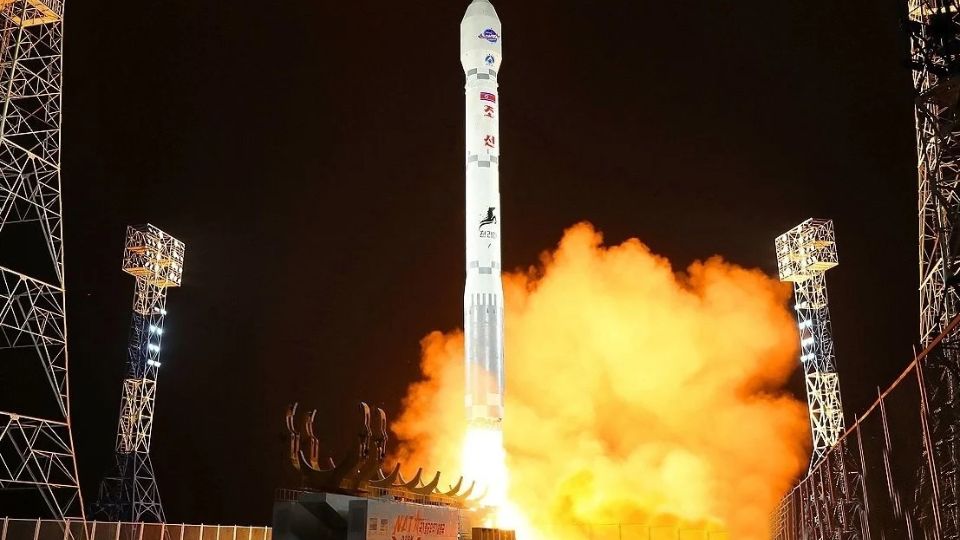North Korea announced on Tuesday that their recent attempt to launch a new rocket with a reconnaissance satellite was unsuccessful. The rocket’s first-stage rocket exploded in midair during the flight.
The deputy director of the North’s National Aerospace Technology Administration stated that the rocket carrying the Malligyong-1-1 satellite exploded after it launched from the Sohae Satellite Launching Ground on the country’s northwest coast on Monday, according to the Korean Central News Agency.
The launch happened shortly after a meeting between the South Korean President, the Japanese Prime Minister, and the Chinese Premier in Seoul. They all agreed to work together to bring peace to the Korean Peninsula.
The launch went against international warnings and criticism that using ballistic missile technology, including for a space launch vehicle, violates U.N. Security Council resolutions.
The launch was unsuccessful because the new-type satellite carrier rocket experienced an air blast during the first-stage flight. This information was reported by the KCNA, citing the NATA official.
According to experts from the North’s launch preparatory committee, a preliminary examination determined that the “accident” was caused by a new engine that uses a combination of liquid oxygen and petroleum. The experts found that the engine’s operational reliability was the reason for the accident.
Also Read: Exploring Some Best and Cheapest Mountain Towns in the US
The KCNA will also investigate other reasons for the failure.
After the rocket was launched, South Korea’s Joint Chiefs of Staff (JCS) reported that the North’s rocket broke into multiple pieces, suggesting that the satellite launch did not go as planned.
The JCS detected a rocket being launched towards the south over the Yellow Sea from the Tongchang-ri area in the northwest of the country at approximately 10:44 p.m. on Monday.
According to the deputy chief of the aerospace administration, experts on the North’s launch preparation team believe that the “accident” was caused by a problem with the reliability of a specific type of engine that uses liquid oxygen and petroleum.
“They will also investigate other possible causes of the failure,” the KCNA said in the report.
After the rocket was launched, South Korea’s Joint Chiefs of Staff reported that the North’s rocket broke into multiple pieces, suggesting that the satellite launch did not go as planned.
The JCS observed a rocket being launched towards the south over the Yellow Sea from the Tongchang-ri area in the northwest of the country at approximately 10:44 p.m. on Monday.
Pyongyang had informed Japan in advance about their plan to launch a satellite before June 4. They also identified three areas where the debris from the rocket was expected to fall, as a safety measure. The liftoff happened on the first day of the eight-day launch period.
Also Read: Exploring Some Best and Cheapest Mountain Towns in the US
The stubborn government has planned to send three satellites into space this year. In November, it successfully launched its first military spy satellite into space.
The presidential National Security Office briefed President Yoon on the launch soon after it happened, according to his office. National Security Advisor Chang Ho-jin led a meeting with high-ranking officials responsible for presidential security.
The people at the meeting strongly criticized the launch because it goes against UNSC resolutions and is a provocative action that puts peace and security at risk in the Korean Peninsula, Northeast Asia, and the international community.
The U.S. Indo-Pacific Command has expressed criticism of North Korea’s rocket launch. They are currently evaluating the situation and working closely with their allies and partners.
“We know that North Korea launched a ballistic missile on May 27, which goes against several United Nations Security Council resolutions. This action increases tensions and could make the security situation in the region and beyond less stable,” said the command in a statement.
The acronym DPRK stands for the official name of North Korea, which is the Democratic People’s Republic of Korea.
On Monday, the military in the South of Korea issued a warning that they would take strong actions in response to the North’s plan to launch. They also conducted air drills near the border between North and South Korea, using advanced fighter jets, to demonstrate their strength.
The rocket launch happened even though some people thought that North Korea’s increased military cooperation with Russia might have helped them improve their abilities to launch rockets into space and develop other military programs.
Experts say that North Korea seems determined to obtain intelligence, surveillance, and reconnaissance assets. They are currently lagging behind their allies in these capabilities, even though they have been focusing on developing powerful weapons systems like submarine-launched ballistic missiles and tactical nuclear weapons.


Leave a Reply